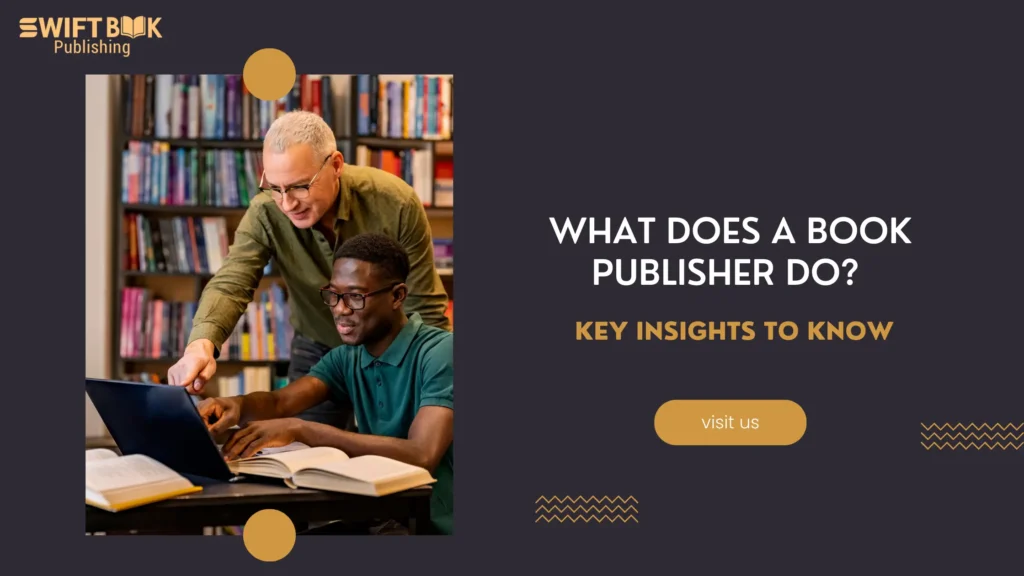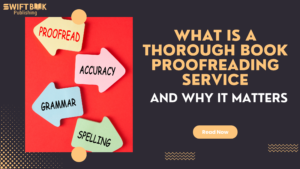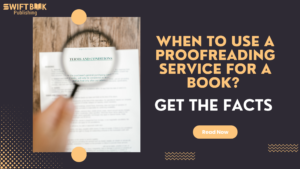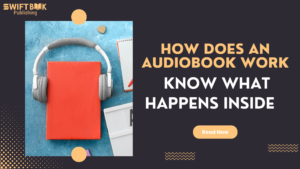Getting a book published is often seen as the final hurdle for authors. Many new authors know the grueling writing, editing, and refining process, but the journey doesn’t end there.
In fact, for many writers, the next step getting a publisher can be an even bigger challenge. Whether you are a first-time author or someone with a few titles under your belt, understanding what a ebook publisher does is crucial for success.
You might be wondering:
- What exactly does a publisher do for my book?
- How do I choose the right one?
- What should I expect once I’ve signed with a publisher?
Whether you’re already writing or just starting to consider publishing, understanding the key roles a book publisher plays and what does a book publisher do is critical for your success. This blog aims to break down the complex world of book publishing, from initial manuscript development to marketing and distribution, so you’ll know what to expect and how to make informed decisions.
1. The First Step: Manuscript Acquisition
One of the first challenges authors face is finding a book publisher or even an ebook. Publishers that believe in their work. But this isn’t as simple as sending your manuscript to anyone and waiting for a deal. Publishers have specific processes for acquiring books, and understanding them will put you in a better position to succeed.
Submission Process
Typically, you’ll submit your manuscript to either a literary agent or directly to a publishing house. Big traditional publishers often require submissions to come through an agent, while smaller independent publishers might accept submissions directly from authors. This is crucial for authors who are looking for reputable book publishers.
Once submitted, editors at publishing houses review your manuscript. They consider not only its literary merit but also its marketability. A book that might be incredibly well-written may still be rejected if it doesn’t align with current market trends or a publisher’s particular focus.
Contract Negotiations
If a publisher likes your work, they’ll offer a contract. Here’s where a book publisher really starts to play a role. Contract negotiations cover everything from the book’s advance (the amount paid to you before the book starts selling) to the percentage of royalties (your earnings from each sale) you’ll receive. Publishers use their experience and market knowledge to offer terms that benefit both the author and themselves.
Challenge for Authors: Many authors struggle to understand complex contract language, and knowing what’s fair or standard can be daunting without a guide.
How a Publisher Helps: A reputable publisher will offer clear, transparent terms and work with you to make sure you’re comfortable with the contract.
2. Editorial Development: Fine-Tuning Your Book
After the contract is signed, the publisher’s editorial team steps in to help refine and improve your manuscript. This process includes several stages, each critical to ensuring that the final product is the best version of your book.
Developmental Editing
The first step in the editing process is developmental editing. Here, editors may suggest significant changes in the structure, pacing, or tone of your book. If you’re writing fiction, they might recommend changes to character development or plot. For nonfiction, they might suggest adding more data or refining your argument.
Challenge for Authors: Many authors feel protective of their work and may struggle with suggested changes, even if they improve the manuscript.
How a Publisher Helps: A professional editorial team provides objective feedback and expertise, working collaboratively with you to enhance your manuscript while keeping your vision intact.
Copyediting
Once the big-picture changes are made, a copyeditor will go through your manuscript to address smaller but equally important details grammar, punctuation, sentence structure, and word choice. This step ensures your book is polished and professional.
Proofreading
The final editorial stage is proofreading, where an editor meticulously checks for any lingering typos or formatting issues before your book is sent to the printer.
3. Design and Production: Bringing Your Book to Life
After your manuscript has been edited, it’s time for design and production. Many authors are unaware of just how much work goes into the visual aspects of a book. This stage is crucial for both printed and digital versions, especially when considering the rise of eBook publishers.
Cover Design
They say you shouldn’t judge a book by its cover, but let’s be honest; everyone does. Your publisher will likely hire a professional designer to create a cover that is both visually appealing and marketable. This involves not just the artwork but also the title font, back cover blurb, and overall layout.
Challenge for Authors: Some authors have a vision for their cover but lack the expertise to translate that vision into a marketable product.
How a Publisher Helps: Publishers know what works in different genres and will collaborate with you to design a cover that fits both your vision and the market.
Interior Design
While most readers don’t consciously think about a book’s interior design, details like font choice, spacing, and chapter headings all affect the reading experience. A publisher’s design team ensures that the inside of your book is as professional as its cover.
Digital Formatting
For authors publishing eBooks, digital formatting is essential. Publishers ensure your book works seamlessly across various e-readers and platforms, making sure text, images, and links function as intended. This is especially important for eBook publishers, who specialize in getting your work into the digital marketplace.
4. Printing and Distribution: Getting Your Book into Readers’ Hands
Once the design phase is complete, it’s time to print and distribute your book. Whether you’re doing a physical release, an eBook release, or both, your publisher manages this complex process for you.
Printing
For print books, the publisher handles the logistics of printing. This involves choosing the right paper, cover material, binding, and more. They also determine the print run size (how many copies are printed initially).
Distribution
The book publisher coordinates with distributors to ensure your book is available in various retail outlets, both online and offline. In today’s market, this means everything from local independent bookstores to major online retailers like Swift.
Challenge for Authors: It can be difficult for self-published authors to get their books into major retailers or to manage distribution effectively.
How a Publisher Helps: Publishers have established relationships with distributors, ensuring that your book reaches the widest possible audience.
5. Marketing and Publicity: Getting the Word Out
Even the best books need effective marketing to reach readers. One of the most valuable roles a publisher plays is in marketing and promoting your book.
Book Launch Strategy
Publishers develop a launch plan tailored to your book’s genre, target audience, and unique selling points. This might include setting up a pre-order campaign, planning author events, and coordinating press releases.
Online Marketing
In today’s digital world, online marketing is critical. Publishers use social media, newsletters, and even paid advertising campaigns to promote your book.
Challenge for Authors: Self-promotion can be overwhelming for authors who lack marketing experience.
How a Publisher Helps: A professional publisher knows how to target the right audience and maximize your book’s visibility across various platforms.
Media Outreach
In addition to online promotion, publishers reach out to traditional media outlets; such as newspapers, radio stations, and television shows to secure coverage for your book.
Book Reviews
Getting reviews is an essential part of a book’s marketing strategy. Publishers often have relationships with reputable reviewers who can help boost your book’s credibility and visibility.
6. Rights and Royalties: Long-Term Income and Opportunities
Beyond the initial sale of your book, publishers also handle the complex world of rights and royalties. This includes both domestic and international markets.
Foreign Rights
Publishers often work to sell the rights to publish your book in other languages or in foreign markets, expanding your readership and increasing your income.
Film and Television Rights
If your book has film or television potential, your publisher may negotiate with production companies to option those rights.
Challenge for Authors: Navigating the world of rights and royalties can be complex, and many authors don’t know where to begin.
How a Publisher Helps: Publishers understand the intricacies of rights management and work to ensure that you benefit financially from all potential revenue streams.
7. Long-Term Support and Career Development
A good publisher isn’t just interested in your current book; they’re invested in your career. Many publishers work closely with authors to help develop future projects and build a long-term professional relationship.
Author Branding
Publishers help authors create and maintain a personal brand, ensuring that your name becomes synonymous with quality work in your genre.
Career Planning
If you plan to write multiple books, your publisher may help you strategize your career by suggesting future projects that align with current market trends or by connecting you with industry professionals who can advance your career.
Tips for Choosing the Right Publisher
Choosing the right publisher is a pivotal decision that can significantly influence your book’s success. To add extra value to this blog, here are some essential tips to guide you through the selection process:
1. Research Publisher Reputation
Before committing to a publisher, investigate their reputation within the industry. Look for reviews from other authors and check their track record for successful book launches. Websites like Goodreads and authors’ forums can provide insights into other authors’ experiences.
2. Understand Their Specialty
Publishers often focus on specific genres or types of books. Ensure the publisher you’re considering has a solid portfolio that aligns with your work. If you’re writing a thriller, for instance, a publisher known for romance novels may not be the best fit.
3. Evaluate Their Distribution Channels
Inquire about the publisher’s distribution network. A strong publisher should have established relationships with both traditional and online retailers. This is particularly important if you want your book to reach a broader audience.
4. Assess Marketing Strategies
Ask potential publishers about their marketing strategies. A good publisher will have a clear plan for promoting your book, including social media campaigns, author events, and connections with media outlets.
5. Check for Author Support
Consider how much support you’ll receive from the publisher. This includes editorial assistance, marketing, and ongoing communication. A responsive and supportive publisher can make a world of difference in your publishing journey.
6. Look for Flexibility in Contracts
Carefully review the contract terms. A reputable publisher should be open to discussing contract clauses, particularly regarding royalties, rights, and future projects. This flexibility can be crucial for your long-term career.
7. Trust Your Instincts
Finally, trust your gut feeling. If something feels off during your interactions with a publisher, it’s worth reconsidering. Building a professional relationship based on trust and mutual respect is vital for a successful partnership.
By applying these tips, you can make a more informed decision and find a publisher that aligns with your goals, ensuring a smoother path to success. Taking the time to choose wisely can set the foundation for a fruitful writing career, making your journey not only more manageable but also more rewarding.
Why Understanding the Publisher’s Role Matters
As you can see, the role of a book publisher goes far beyond simply printing and distributing books. From manuscript development to marketing and long-term career support, book publishers are involved in nearly every aspect of your book’s journey from your desk to the reader’s hands.
For authors facing the daunting task of bringing their work to the world, partnering with a professional book publisher can provide the expertise, resources, and support needed to succeed. Understanding what a book publisher does and what they can offer helps you make more informed decisions and sets you up for a more successful publishing experience.
Choosing the right publisher could make all the difference if you’re ready to take the next step in your writing career.







